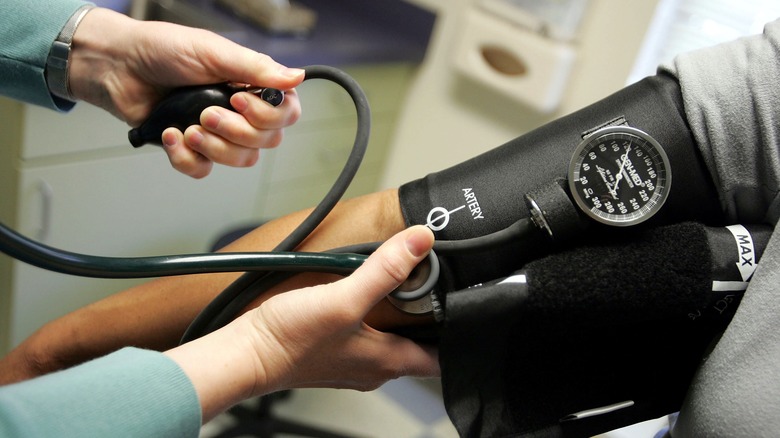Things You Should Never Say To Your Doctor
The way we access health care has evolved over many decades, not just in how our prevailing health insurance system has us selecting and paying for providers, but also in what's expected in terms of doctor-patient communication. This is according to the authors of a 1999 paper published in the Journal of General Internal Medicine (JGIM) regarding the challenges and opportunities inherent in the doctor-patient relationship — and strategies for improving that relationship in the name of optimizing quality of care.
Up until around the mid-'80s, the model of the doctor-patient relationship was more paternalistic than partnership, noted the authors a 2007 paper published in the International Journal of Surgery. In the past, it was expected that a doctor gave orders, and the patient was to follow them — whether or not the patient understood, absorbed, and knowingly consented to whatever that happened to entail. That has been changing with the advent of the "patient-centered" model, whose goal is better health outcomes through a more individualized approach to medicine (via the NEJM Group), even with less time per patient available for doctors to spend (via another 1999 paper published in JGIM).
At the center of the patient-centered model is the "patient interview," which requires, at minimum, respectful, honest, focused, and relevant participation by both parties in order to be productive. In furtherance of better communication and a productive doctor-patient relationship in general, here are some of things that you should never say to your doctor, according to doctors and other medical experts.
Lying to your doctor about past surgeries is not helpful
"The physician who encourages open communication may obtain more complete information, enhance the prospect of a more accurate diagnosis, and facilitate appropriate counseling, thus potentially improving adherence to treatment plans that benefits long-term health," according to a 2011 position paper published by The American College of Obstetricians and Gynecologists. Of course, all that the doctor can do is provide a safe space for information gathering. For the doctor-patient partnership to work, the patient also needs to provide complete information, which is to say accurately and in full.
One topic that will inevitably come up in the overall dialogue between doctor and patient — which includes your written health history — is your prior surgical history. According to Dr. Caesar Djavaherian, chief medical officer and co-founder at Carbon Health, it is of critical importance that you should never leave anything out of your surgical history, even surgeries from childhood. First, the fact that you have had a particular surgery could provide valuable information to your doctor about your health and your risk of various diseases and conditions, including, but not limited to how you handle anesthesia during surgery. It could also provide your doctor with greater insight as to whatever current symptoms you might be having. Dr. Gaspere Geraci, family physician, says, "Anytime you have something operated on, removed or altered in some way, it might influence how future instances or symptoms are considered" (via Insider).
Never spin your health history, including about any pregnancies
There are certain scenarios in which there's no obligation to disclose health information, including a pregnancy. One is in the context of a job interview (via the Richmond Times-Dispatch). On the opposite end of the spectrum, there is the dialogue between doctor and patient. In this context, meaningful dialogue between doctor and patient requires full disclosure of any pregnancy, whether current or one from your past — including those that went to term and those that did not, regardless of the reason.
Your current pregnancy status could impact diagnostic and/or treatment choices in real time, according to Dr. Mary Jacobson, chief medical officer at Alpha. "Some medications that we prescribe can cause fetal malformations," she told Best Life. Jacobson added that even "something as seemingly unrelated to pregnancy as Accutane" can cause birth defects. As for your prior pregnancy history, among other things, that's one of the factors that helps your doctor assess your reproductive health, according to Dr. Caesar Djavaherian, via Insider.
But we're not just talking about communication with women's health professionals. Information about prior pregnancies and how they played out can offer your healthcare provider clues about your current health, including your risk of certain diseases and conditions, according to the Komen Foundation. For example, as the Komen Foundation points out, "Breast cancer risk is increased for about 10 years after a first birth. Then, it drops below the risk of women who don't have children."
Saying you don't smoke if you do is lying
Your doctor can tell if you smoke tobacco products, even if it's just on occasion, according to Dr. Jasmine Shaikh (via MedicineNet). Your bloodwork may offer clues, for one thing. In addition, your appearance may give you away, according to 2013 letter to the editor appearing in the journal, Lung India. For example, your fingers, fingernails, and teeth may exhibit staining, and your breath may also give you away, no matter how consistent you practice good oral hygiene.
But getting caught in a lie shouldn't be what keeps you from pretending to your doctor that you don't use tobacco. What should really be keeping you from making that omission is the fact that your doctor cannot help you make the best possible health decisions if they don't know your relationship to tobacco. "When doctors evaluate patients, they look at their vital signs and other symptoms," Dr. Caesar Djavaherian told Insider, and tobacco use "can impact your vital signs, such as your heart rate, as well as elevate certain symptoms like tingling in the fingertips."
In other words, if you want to improve your chances of a productive working relationship with your physician, don't hide your smoking status — and that includes your prior history of smoking tobacco. Because your doctor knows when you're lying about all these things.
Avoid underselling how much alcohol you consume
When your doctor (or any other healthcare provider to whom you have entrusted your health) asks you how much you drink, we're going to take a wild guess and presume that you would not claim to be a heavy drinker if you hardly drink at all. Because what would be the point of lying? By the same token, you should never tell your doctor you don't drink alcohol if you do, or underestimate the amount of alcohol that you do drink, according to Dr. Brian Doyle, UCLA School of Medicine, who told WebMD that lying about alcohol use is so prevalent that some doctors, himself included, have a rule of thumb whereby they double the amount that any patient claims to drink.
You and your doctor can only arrive at suitable health decisions if your doctor has an accurate picture of the substances you're putting in your body. For example, your alcohol use can explain apparent anomalies in your blood work, including elevated liver enzymes, which can rule out certain conditions and help point the way to others. By way of another example, excessive alcohol use (and if you're feeling the need to lie about your alcohol intake, you might want to consider the possibility that it's excessive) can put you at risk of high blood pressure — while admitting the truth will help your doctor determine the proper course for mitigation. One in five Americans lie to their doctor regarding how much alcohol they drink (via American Addiction Centers).
Don't silo your doctor
Information silos (which basically means you're not sharing applicable information) can be a thorn in the side of any organization. So too, can information silos come between you and your doctor. This, of course, goes both ways. But to the extent that it's within your control, best practices dictate making a concerted effort to not "silo" your doctor. For example, the age of your first pregnancy can be relevant to your cardiologist, according to NYU Langone Medical Center News. It could also prove useful with regard to your mental health, according to a 2014 study published in the Journal of Obstetrics and Gynecology. So even if you think a particular piece of your health history isn't relevant to a certain doctor, disclose it anyway — because the more information they have about your medical history, the better they can help you.
And that includes your current status. If you are experiencing a symptom, you don't want to keep that from your doctor, not to the extent that you're hoping for an effective doctor-patient dialogue. A surprising number of patients do keep symptoms from their doctor, however, and that includes the 43% of Californians surveyed who anticipated that they would keep their depression symptoms to themselves, rather than share with their doctors. And that's because, "they feel their emotional difficulties are off-topic, they don't want to be prescribed antidepressants, or they're afraid a record of the conversation will be seen by employers" (via CNN).
Saying your high blood pressure is white coat syndrome might raise eyebrows
If you're getting a high blood pressure reading at your doctor's office, it's relevant to your doctor — even if you're certain that it's "white coat syndrome." The term is used to refer to blood pressure readings done in a clinical setting that are higher-than-usual for any given person in any other setting, according to Dr. Luke Laffin, preventative cardiologist (via the Cleveland Clinic).
"While this pattern was once thought to be relatively benign, it actually is not," Dr. Laffin explains. "Studies have found that people with this condition have a higher risk of heart attack and stroke than people whose blood pressure is normal when they visit their provider." And by directing the conversation toward the topic of white coat syndrome, you may be interfering with your doctor's opportunity to address with you the actual state of your health. Further, you may hinder their ability to work with you toward making improvements.
"These patients need to be followed more closely and ensure that out-of-office blood pressure monitoring is performed on a semi-regular basis," Dr. Laffin says. And that requires patient cooperation. It's also in your best interest to avoid doing these things before a doctor's appointment.
If anything is pressing, don't say it last, say it first
Anyone who has ever been on the receiving end of a "doorknob confession," as Licensed Mental Health Counselor Catherine Stack referred to them via Simple Practice, will recognize the feeling of dread that they're left with. That includes your healthcare provider because you have chosen the worst possible moment — when the time to talk has already expired — to bring up something that might have changed their interpretation of everything up until that moment.
Dr. Ryan Gray, former U.S. Air Force flight surgeon, refers to the "doorknob question" in a piece he wrote for HCP Live. He says it's not merely annoying, but pretty much ensures that whatever it is concerning the patient is not going to be dealt with, at least in that moment, with "adequate time and attention." To ensure you get the proper attention you need, he says, "Patients should always bring up their most pressing concerns first."
Avoid asking what your doctor would do
The issue with this question is that it wastes yours and the doctor's time. You see, it's not relevant what the doctor would do if they were the one with a health decision to make, explains Dr. Danielle Ofri, associate professor of medicine at NYU School of Medicine, to Oprah.com. Your doctor has their own health history and their own values, just as you do. The right question to ask is something more along the lines of: "Given my situation, what do you think I should do?"
"I try to help patients work through their own values using the medical facts I can offer," Ofri explains, offering the example of a patient whose "general philosophy was to leave everything to God." The patient asked whether she would consider having a defibrillator implanted. Although Ofri ultimately recommended the procedure to her patient, it was after considering the patient's personal circumstances — which not only included their relationship to God — but also their age, and home life such as having a wife, children, and grandchildren to think of.
Doctors have feelings, so try not to say hurtful things
The Washington Post investigated the importance of kindness to the doctor-patient relationship. "When doctors are kind, patients do better," says Michael Stein, chair of health law, policy and management at the Boston University School of Public Health. But the reverse is true as well, according to Dr. Ryan Gray, who tells HCP Live that he wishes more patients understood that doctors are "regular people" who have feelings about the way they are treated by other people (via Inc.) Being treated poorly by someone can negatively impact the relationship between themselves and the other person. That, of course, includes your doctor, as Gray points out: "Patients need to realize that doctors are their partners, and getting belligerent or nasty will only harm the relationship."
Gray does not appear to be suggesting that if you say something unkind to your doctor then you should expect less than adequate healthcare, but rather that if you establish a pattern of doing so, you may be inadvertently thwarting optimal communication between you and your physician, even if subconsciously. None of this is to say that you should never disagree with your doctor — or even raise the possibility that they may be mistaken about something. Doctors know that mistakes are possible, Gray says, which means that respectful questions and discussions with your doctor can improve outcomes.
Don't try to hide what you think may be mental health issues
With roughly 47 million American adults living with mental illness (via FHE Health), there's been some movement in recent years toward normalizing mental health issues and the discussion surrounding them, according to the Massachusetts Department of Mental Health. Nevertheless, societal stigma associated with mental health issues persists, and some people feel reluctant to discuss their related symptoms with their healthcare providers, according to a 2017 paper published in the academic journal, Healthcare Management Forum. People dealing with mental health issues may shy away from discussing these issues with their physicians for other reasons, including the belief that doing so won't be useful because "mental health" is not the physician's area of expertise. In addition, some mental health issues, such as eating disorders, may be associated with a tendency to hide and even lie about symptoms, via Science Direct.
As you might have guessed, hiding symptoms that may be associated with mental illness from your doctor is a bad idea, notes FHE Health. No one other than your own doctor is better equipped to address your specific issues, and not addressing mental health issues is seldom associated with spontaneous recovery. Further, some symptoms you may associate with certain mental health conditions (e.g. loss of energy) could signify physical conditions that may be worth investigating, such as anemia.
If you or someone you know is struggling with mental health, please contact the Crisis Text Line by texting HOME to 741741, call the National Alliance on Mental Illness helpline at 1-800-950-NAMI (6264), or visit the National Institute of Mental Health website.











